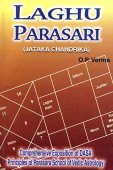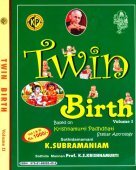Bhukti: 21 definitions
Introduction:
Bhukti means something in Hinduism, Sanskrit, the history of ancient India, Marathi, Hindi. If you want to know the exact meaning, history, etymology or English translation of this term then check out the descriptions on this page. Add your comment or reference to a book if you want to contribute to this summary article.
In Hinduism
Vastushastra (architecture)
Source: Wisdom Library: Vāstu-śāstraBhukti (भुक्ति, “enjoyment”) refers to one of the ten effects of vyaya (“loss”), according to the Mānasāra. Vyaya is the second of the āyādiṣaḍvarga, or “six principles” that constitute the “horoscope” of an architectural or iconographic object. Their application is intended to “verify” the measurements of the architectural and iconographic object against the dictates of astrology that lay out the conditions of auspiciousness.
Bhukti also refers to the second of nine aṃśa (part), according to the same work. Aṃśa is the alternative sixth of the āyādiṣaḍvarga.
The particular vyaya (e.g., bhukti) and aṃśa (e.g., bhukti) of all architectural and iconographic objects (settlement, building, image) must be calculated and ascertained. This process is based on the principle of the remainder. An arithmetical formula to be used in each case is stipulated, which engages one of the basic dimensions of the object (breadth, length, or perimeter/circumference).
Like in the case of the fruits of āya, all ten effects of vyaya must be considered as auspicious. Among the nine taskara, the ones named ṣaṇḍa and vipat are inauspicious, and should therefore be avoided.

Vastushastra (वास्तुशास्त्र, vāstuśāstra) refers to the ancient Indian science (shastra) of architecture (vastu), dealing with topics such architecture, sculpture, town-building, fort building and various other constructions. Vastu also deals with the philosophy of the architectural relation with the cosmic universe.
Jyotisha (astronomy and astrology)
Source: Wikibooks (hi): Sanskrit Technical TermsBhukti (भुक्ति).—Motion or daily motion. Note: Bhukti is a Sanskrit technical term used in ancient Indian sciences such as Astronomy, Mathematics and Geometry.

Jyotisha (ज्योतिष, jyotiṣa or jyotish) refers to ‘astronomy’ or “Vedic astrology” and represents the fifth of the six Vedangas (additional sciences to be studied along with the Vedas). Jyotisha concerns itself with the study and prediction of the movements of celestial bodies, in order to calculate the auspicious time for rituals and ceremonies.
Vaishnavism (Vaishava dharma)
Source: Pure Bhakti: Brhad BhagavatamrtamBhukti (भुक्ति) refers to:—Sense enjoyment. (cf. Glossary page from Śrī Bṛhad-bhāgavatāmṛta).

Vaishnava (वैष्णव, vaiṣṇava) or vaishnavism (vaiṣṇavism) represents a tradition of Hinduism worshipping Vishnu as the supreme Lord. Similar to the Shaktism and Shaivism traditions, Vaishnavism also developed as an individual movement, famous for its exposition of the dashavatara (‘ten avatars of Vishnu’).
Shaktism (Shakta philosophy)
Source: Google Books: ManthanabhairavatantramBhukti (भुक्ति) refers to “worldly benefit”, according to the Kubjikāmatatantra: the earliest popular and most authoritative Tantra of the Kubjikā cult.—Accordingly, “Both worldly benefit (bhukti) and liberation come from the Command [i.e., ājñā]. It accomplishes everything in a moment. One gets all that one wants, if (one’s) devotion is unwavering”.
Source: Brill: Śaivism and the Tantric Traditions (shaktism)Bhukti (भुक्ति) refers to “enjoyment”, according to Sāhib Kaul’s Śārikāstrotra.—Accordingly, “[...] He who recites your next syllable, which is īśa with abja and the one above the left ear, his enemy, although invincible even for all the gods, will instantly, in the wink of an eye, become a guest in the house of Death. He who remembers your next syllable, which is īśa together with vaktravṛtta and vahni, will have at his disposal ‘enjoyment’ (bhukti), liberation, the method of real vicāra, and devotion. [...]”.

Shakta (शाक्त, śākta) or Shaktism (śāktism) represents a tradition of Hinduism where the Goddess (Devi) is revered and worshipped. Shakta literature includes a range of scriptures, including various Agamas and Tantras, although its roots may be traced back to the Vedas.
India history and geography
Source: archive.org: Personal and geographical names in the Gupta inscriptionsBhukti (भुक्ति) refers to a name-ending for place-names mentioned in the Gupta inscriptions. Bhukti (from √bhuj) literally means “enjoyment” or possession. Bhukti denoted an administrative division smaller than a modern Tehsil or Taluka in the Deccan and M.P., but in Northern India under the Guptas and Pratihāras it denoted a unit as large as the Commissioner’s Division in modern times. Thus Pratiṣṭhānabhukti consisted of only 12 and Koppārakabhukti of 50 villages in the Deccan under the Rāṣṭrakūṭas, whereas under the Guptas the Puṇḍravardhanabhukti comprised of the districts of Dinajpur, Bogra and Rajshahi, and Magadhabhukti included the districts of Gayā and Pāṭaliputra.
Bhukti is changed into huti as Jejakabhukti, Jejahuti. The unit bhukti which so often appears in the inscriptions of the Gupta period as the designation of an administrative unit is not frequently found in the early medieval period. The mention of a Nagara-bhukti is also made in Deo-Baranark Inscription of Jīvitagupta II.
Source: Cologne Digital Sanskrit Dictionaries: Indian Epigraphical GlossaryBhukti.—(IE 8-4; EI 28, 33), a province including a group of districts called viṣaya or maṇḍala; small territorial unit like a Pargana in South India; cf. bhoga. (IE 8-3; 8-4; CII 3), literally, ‘enjoyment’; same as bhoga; a jāgīr; originally meaning ‘enjoyment’; then ‘property’ or ‘a jāgīr’; then ‘a province’. See bhoga. (BL), personal property. Cf. putti, pukti (SITI), the enjoyment of a property. Note: bhukti is defined in the “Indian epigraphical glossary” as it can be found on ancient inscriptions commonly written in Sanskrit, Prakrit or Dravidian languages.

The history of India traces the identification of countries, villages, towns and other regions of India, as well as mythology, zoology, royal dynasties, rulers, tribes, local festivities and traditions and regional languages. Ancient India enjoyed religious freedom and encourages the path of Dharma, a concept common to Buddhism, Hinduism, and Jainism.
Languages of India and abroad
Marathi-English dictionary
Source: DDSA: The Molesworth Marathi and English Dictionarybhukti (भुक्ति).—f (S) Making a meal. v kara. Pr. agōdhara bhukti maga bhakti. 2 Enjoyment, fruition, usufruct. 3 Space crossed or accomplished (by a heavenly body in its course).
Source: DDSA: The Aryabhusan school dictionary, Marathi-Englishbhukti (भुक्ति).—f Making a meal. Enjoyment.
Marathi is an Indo-European language having over 70 million native speakers people in (predominantly) Maharashtra India. Marathi, like many other Indo-Aryan languages, evolved from early forms of Prakrit, which itself is a subset of Sanskrit, one of the most ancient languages of the world.
Sanskrit dictionary
Source: DDSA: The practical Sanskrit-English dictionaryBhukti (भुक्ति).—f. [bhuj-ktin]
1) Eating, enjoyment; भुक्तिं मुक्तिं च विन्दति (bhuktiṃ muktiṃ ca vindati) Rāmarakṣā Stotra. 12.
2) (In law) Possession, fruition; प्रमाणं लिखितं भुक्तिः साक्षिणश्चेति कीर्तितम् (pramāṇaṃ likhitaṃ bhuktiḥ sākṣiṇaśceti kīrtitam) Y.2.22; Pañcatantra (Bombay) 3.94.
3) Food.
4) The daily motion of a planet.
5) A limit.
Derivable forms: bhuktiḥ (भुक्तिः).
Source: Cologne Digital Sanskrit Dictionaries: Shabda-Sagara Sanskrit-English DictionaryBhukti (भुक्ति).—f.
(-ktiḥ) 1. Eating. 2. Possession, fruition, usufruct. 3. Food. 4. The diurnal motion of a planet. E. bhuj to eat, aff. ktin .
Source: Cologne Digital Sanskrit Dictionaries: Benfey Sanskrit-English DictionaryBhukti (भुक्ति).—i. e. 2. bhuj + ti, f. 1. Fating, [Pañcatantra] 133, 2. 2. Food, [Rājataraṅgiṇī] 5, 170. 3. Fruition. 4. Possession, [Mānavadharmaśāstra] 8, 252; [Pañcatantra] iii. [distich] 93; iv. [distich] 76 (but cf. also Böhtl. Ind. Spr. 125).
Source: Cologne Digital Sanskrit Dictionaries: Cappeller Sanskrit-English DictionaryBhukti (भुक्ति).—[feminine] eating, enjoyment, food; fruition, possession.
Source: Cologne Digital Sanskrit Dictionaries: Monier-Williams Sanskrit-English Dictionary1) Bhukti (भुक्ति):—[from bhuj] f. enjoyment, eating, consuming, [Āśvalāyana-gṛhya-sūtra; Pañcatantra]
2) [v.s. ...] fruition, possession, usufruct, [Manu-smṛti; Yājñavalkya; Kāvya literature]
3) [v.s. ...] food, victuals, [Kāvya literature; Rājataraṅgiṇī]
4) [v.s. ...] (in [astronomy]) the daily motion of a planet, [Sūryasiddhānta] (cf. pakṣa-bh)
5) [v.s. ...] a limit, [Monier-Williams’ Sanskrit-English Dictionary]
Source: Cologne Digital Sanskrit Dictionaries: Yates Sanskrit-English DictionaryBhukti (भुक्ति):—(ktiḥ) 2. f. Eating; possession.
Source: DDSA: Paia-sadda-mahannavo; a comprehensive Prakrit Hindi dictionary (S)Bhukti (भुक्ति) in the Sanskrit language is related to the Prakrit word: Bhutti.
[Sanskrit to German]
Sanskrit, also spelled संस्कृतम् (saṃskṛtam), is an ancient language of India commonly seen as the grandmother of the Indo-European language family (even English!). Closely allied with Prakrit and Pali, Sanskrit is more exhaustive in both grammar and terms and has the most extensive collection of literature in the world, greatly surpassing its sister-languages Greek and Latin.
Hindi dictionary
Source: DDSA: A practical Hindi-English dictionaryBhukti (भुक्ति):—(nf) enjoyment; use, possession.
...
Kannada-English dictionary
Source: Alar: Kannada-English corpusBhukti (ಭುಕ್ತಿ):—
1) [noun] the act of eating (as food).
2) [noun] the action or state of enjoying; possession and use the enjoyment of something; enjoyment.
3) [noun] (astron.) the daily motion of a planet.
4) [noun] (astrol.) the favour or disfavour of a planet for a brief period, during the reigning period of another planet.
Kannada is a Dravidian language (as opposed to the Indo-European language family) mainly spoken in the southwestern region of India.
Nepali dictionary
Source: unoes: Nepali-English DictionaryBhukti (भुक्ति):—n. 1. enjoyment; eating; 2. possession;
Nepali is the primary language of the Nepalese people counting almost 20 million native speakers. The country of Nepal is situated in the Himalaya mountain range to the north of India.
See also (Relevant definitions)
Starts with: Bhukti-mandala, Bhuktibhava, Bhuktida, Bhuktidana, Bhuktidiksha, Bhuktigey, Bhuktigeysu, Bhuktimarga, Bhuktimati, Bhuktimukti, Bhuktimuktiphala, Bhuktipati, Bhuktipatra, Bhuktiphala, Bhuktiprada, Bhuktiprakarana, Bhuktisaptashati, Bhuktivarjita, Bhuktivishesha, Bhuktiyoga.
Ends with (+4): Annabhukti, Ekabhukti, Jejabhukti, Jejakabhukti, Jivabhukti, Kopparakabhukti, Kubhukti, Madhyabhukti, Masabhukti, Nagarabhukti, Pakshabhukti, Payobhukti, Pratishthanabhukti, Pundravardhanabhukti, Purvabhukti, Purvvabhukti, Samsthanabhukti, Samvatsarabhukti, Shravastibhukti, Sphutabhukti.
Full-text (+93): Purvabhukti, Tirabhukti, Bhuktipatra, Bhuktivarjita, Upabhukti, Bhuktiprada, Masabhukti, Pakshabhukti, Jejahuti, Pundravardhana, Bhuktiprakarana, Bhuktidana, Bhuktisaptashati, Bhuktimati, Virabhukti, Tairabhukta, Bhukti-mandala, Kubhukti, Pratigrahita, Purvvabhukti.
Relevant text
Search found 31 books and stories containing Bhukti; (plurals include: Bhuktis). You can also click to the full overview containing English textual excerpts. Below are direct links for the most relevant articles:
Impact of Vedic Culture on Society (by Kaushik Acharya)
Territorial Units < [Chapter 5]
Sanskrit Inscriptions (E): The Pāṇḍuvaṃśīs < [Chapter 3]
2. Concept of Dāna in Land Grants during Early and Early Medieval Periods < [Chapter 2]
Garga Samhita (English) (by Danavir Goswami)
Verse 1.12.39 < [Chapter 12 - Description of Śrī Nanda’s Festival]
Verse 3.1.6 < [Chapter 1 - The Worship of Śrī Girirāja]
Verse 6.14.6 < [Chapter 14 - The Glories of Ratnākara, Raivata, and Kācala]
Chaitanya Bhagavata (by Bhumipati Dāsa)
Verse 3.2.379 < [Chapter 2 - Description of the Lord’s Travel Through Bhuvaneśvara and Other Placesto Jagannātha Purī]
Verse 1.13.136-137 < [Chapter 13 - Defeating Digvijayī]
Jain Remains of Ancient Bengal (by Shubha Majumder)
Geographical as well as Geo-political unit of Zone I < [Chapter 2 - Geographical Setting of the Study Area]
Geographical as well as Geo-political unit of Zone IV < [Chapter 2 - Geographical Setting of the Study Area]
Introduction < [Chapter 4 - Distribution of Sites Yielding Jaina Remains]
Bhakti-rasamrta-sindhu (by Śrīla Rūpa Gosvāmī)
Verse 1.2.225 < [Part 2 - Devotional Service in Practice (sādhana-bhakti)]
Verse 1.2.22 < [Part 2 - Devotional Service in Practice (sādhana-bhakti)]
Verse 1.3.43 < [Part 3 - Devotional Service in Ecstasy (bhāva-bhakti)]
Nrisinha Stotra < [The Divine Strotras]
Related products


